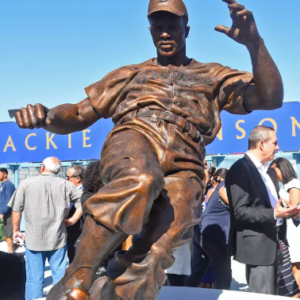The first black major league baseball player in the 20th century, Jackie Robinson, has figured in historical parallels galore. Anyone who blazes a trail can be compared to him, at least loosely. Much rarer are comparisons to his style of play, especially in running the bases. In that respect, the baseball star he may have been most vividly likened to was a long-retired white one, Ty Cobb.
Cobb, who had retired after the 1928 season with close to 900 stolen bases, was a terror on the base paths to opposing pitchers in much of his career, which began in 1905. In naming Robinson the big-league Rookie of the Year in 1947, the Sporting News declared, “He’s ‘Ebony Ty Cobb’ on Base Paths.”
Three years later, in bestowing an award on Robinson at his magazine’s annual dinner, Sport managing editor Albert R. Perkins introduced him as “the most electrifying base runner since Ty Cobb.”
A more colorful comparison to Cobb was made in 1948. “Any man beyond 40 can recall the saga of Ty Cobb, his flashing spikes, his violent collisions and resultant fights with infielders — one of whom actually stabbed Cobb with a long nail one day as Ty plunged into third base,” wrote sportswriter Bob Considine. “So it was into garish (violent) situations of this sort that Robinson soon found himself. Hairs would bristle on every slide he made, and rival runners who had to cross the base which Robinson himself guarded — first base — often found themselves colliding with him.”
Cobb no doubt appreciated being analogized to such an aggressive runner. But descriptions such as Considine’s likely irritated Cobb, because it helped others recall him as a “mean” player, for his supercompetitive persona during a game, including his unusual way of sliding into bases with his spikes.
In a clever way in 1951, noted black poet Sterling A. Brown likened Robinson to Cobb in the context of interracial progress. Brown began by noting Robinson’s greater freedom with the passing years to “argue with umpires and tangle with over-aggressive rivals as any other player can, and without its becoming a racial issue.” A few sentences later, he wrote, “The American public seems willing now to recognize that on the baseball diamond a Negro ballplayer may well be temperamentally closer to Ty Cobb than to (personable black botanist) George Washington Carver.”
With less subtlety in 1955, Newsday columnist Jimmy Cannon wrote that Robinson “plays with a fierce recklessness. Anger is part of his skill. He resembles Ty Cobb more than any man in this generation. There is no compromise for him but this also makes him one of the big attractions of sports.”
In a similarly blunt manner, Chicago Tribune columnist David Condon wrote the following at the end of Robinson’s career in 1957: “Jackie Robinson was a turbulent, bellicose, and arrogant baseball player, and many criticized him as such, altho the motives of Jackie’s most avowed detractors were always suspect, and you lamented the inconsistency of these detractors when they lauded the great competitive spirit of athletes whose behavior was identical to Jackie’s but whose color happened to be different.”
A few sentences earlier, Condon quoted Robinson as having said, “If I’m a troublemaker, it’s only because I can’t stand losing.” Condon also printed a quote from Cobb about not being able to tolerate being second best.
Branch Rickey, the Brooklyn Dodgers’ general manager, was responsible for Robinson’s ascent first to the high minors and then the major leagues. He also had played against Cobb and served with him in the military in 1918, in a training unit that taught chemical weapons protection. When Robinson was elected to the Hall of Fame in 1962, Rickey said, “He was Ty Cobb-ish in every way — perhaps not as fast — but nearly.”
More descriptively back in 1950, Rickey told reporters the following soon after the Sport magazine dinner noted above: “‘When (Jackie) Robinson first came to the Dodgers,’ he said, ‘our colleagues all wanted to play us, but they couldn’t get the use of the parks. Today that’s all changed and we have no trouble booking Robinson. But we must still go ahead slowly. Some day there may be an incident. Ty Cobb used to get into trouble at least once a year. When the time comes that a Negro is involved I trust that too much significance isn’t attached to it. But it’s a matter of concern. The problem of the Negro in baseball hasn’t been solved.”’
For his part, Robinson compared himself to Cobb intellectually in 1952. (Incidentally, they would both support Republican Richard M. Nixon for president in 1960.)
But back in 1952, Cobb had just claimed, in a two-part series in Life magazine, that baseball was played at a superior level back in his day. When Dick Young of the New York Daily News asked Robinson about Cobb’s take on base stealing in their respective eras, Robinson called Cobb “way off base” and also said, “I’m not looking for an argument with Ty Cobb, but I don’t think Cobb is any smarter than I am.”
Young added, “It is Robinson’s contention that modern ball players, generally speaking, know more about the game of baseball, and play a smarter brand of ball because they receive greater instructions in fundamentals.”
Cobb, despite only occasionally attending games in his post-career, did get to see Robinson play. In 1953, after Dodgers game in Chicago, Cobb said of him, “He’s all right” and likened him to three Hall of Fame second basemen, including Rogers Hornsby, who starred in the 1920s. “Fellows like that, you know.”
Jackie Robinson Day is held annually to mark his big-league debut on April 15, 1947. While it is his pioneering feat that is always most closely commemorated, Robinson can also be celebrated for his more incidentally racial aspects, especially his way of playing the game.

